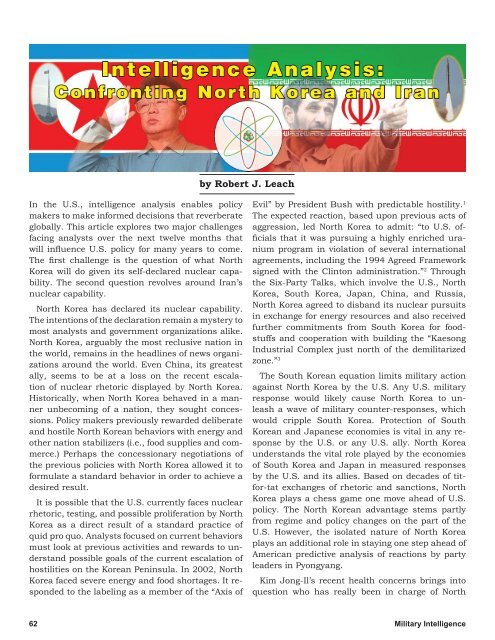George w. casey jr. - Federation of American Scientists
George w. casey jr. - Federation of American Scientists
George w. casey jr. - Federation of American Scientists
Create successful ePaper yourself
Turn your PDF publications into a flip-book with our unique Google optimized e-Paper software.
y Robert J. Leach<br />
In the U.S., intelligence analysis enables policy<br />
makers to make informed decisions that reverberate<br />
globally. This article explores two major challenges<br />
facing analysts over the next twelve months that<br />
will influence U.S. policy for many years to come.<br />
The first challenge is the question <strong>of</strong> what North<br />
Korea will do given its self-declared nuclear capability.<br />
The second question revolves around Iran’s<br />
nuclear capability.<br />
North Korea has declared its nuclear capability.<br />
The intentions <strong>of</strong> the declaration remain a mystery to<br />
most analysts and government organizations alike.<br />
North Korea, arguably the most reclusive nation in<br />
the world, remains in the headlines <strong>of</strong> news organizations<br />
around the world. Even China, its greatest<br />
ally, seems to be at a loss on the recent escalation<br />
<strong>of</strong> nuclear rhetoric displayed by North Korea.<br />
Historically, when North Korea behaved in a manner<br />
unbecoming <strong>of</strong> a nation, they sought concessions.<br />
Policy makers previously rewarded deliberate<br />
and hostile North Korean behaviors with energy and<br />
other nation stabilizers (i.e., food supplies and commerce.)<br />
Perhaps the concessionary negotiations <strong>of</strong><br />
the previous policies with North Korea allowed it to<br />
formulate a standard behavior in order to achieve a<br />
desired result.<br />
It is possible that the U.S. currently faces nuclear<br />
rhetoric, testing, and possible proliferation by North<br />
Korea as a direct result <strong>of</strong> a standard practice <strong>of</strong><br />
quid pro quo. Analysts focused on current behaviors<br />
must look at previous activities and rewards to understand<br />
possible goals <strong>of</strong> the current escalation <strong>of</strong><br />
hostilities on the Korean Peninsula. In 2002, North<br />
Korea faced severe energy and food shortages. It responded<br />
to the labeling as a member <strong>of</strong> the “Axis <strong>of</strong><br />
Evil” by President Bush with predictable hostility. 1<br />
The expected reaction, based upon previous acts <strong>of</strong><br />
aggression, led North Korea to admit: “to U.S. <strong>of</strong>ficials<br />
that it was pursuing a highly enriched uranium<br />
program in violation <strong>of</strong> several international<br />
agreements, including the 1994 Agreed Framework<br />
signed with the Clinton administration.” 2 Through<br />
the Six-Party Talks, which involve the U.S., North<br />
Korea, South Korea, Japan, China, and Russia,<br />
North Korea agreed to disband its nuclear pursuits<br />
in exchange for energy resources and also received<br />
further commitments from South Korea for foodstuffs<br />
and cooperation with building the “Kaesong<br />
Industrial Complex just north <strong>of</strong> the demilitarized<br />
zone.” 3<br />
The South Korean equation limits military action<br />
against North Korea by the U.S. Any U.S. military<br />
response would likely cause North Korea to unleash<br />
a wave <strong>of</strong> military counter-responses, which<br />
would cripple South Korea. Protection <strong>of</strong> South<br />
Korean and Japanese economies is vital in any response<br />
by the U.S. or any U.S. ally. North Korea<br />
understands the vital role played by the economies<br />
<strong>of</strong> South Korea and Japan in measured responses<br />
by the U.S. and its allies. Based on decades <strong>of</strong> titfor-tat<br />
exchanges <strong>of</strong> rhetoric and sanctions, North<br />
Korea plays a chess game one move ahead <strong>of</strong> U.S.<br />
policy. The North Korean advantage stems partly<br />
from regime and policy changes on the part <strong>of</strong> the<br />
U.S. However, the isolated nature <strong>of</strong> North Korea<br />
plays an additional role in staying one step ahead <strong>of</strong><br />
<strong>American</strong> predictive analysis <strong>of</strong> reactions by party<br />
leaders in Pyongyang.<br />
Kim Jong-Il’s recent health concerns brings into<br />
question who has really been in charge <strong>of</strong> North<br />
62 Military Intelligence















